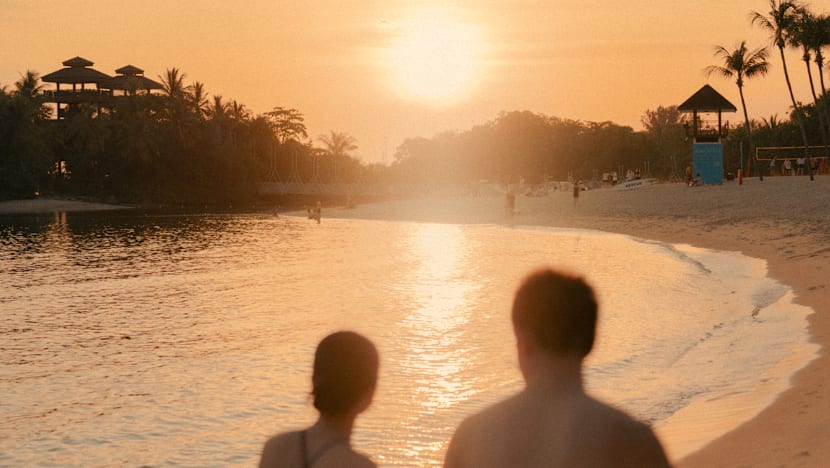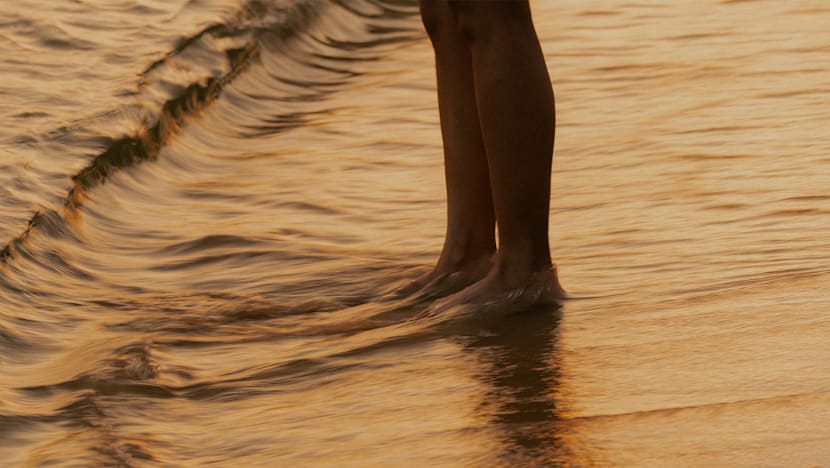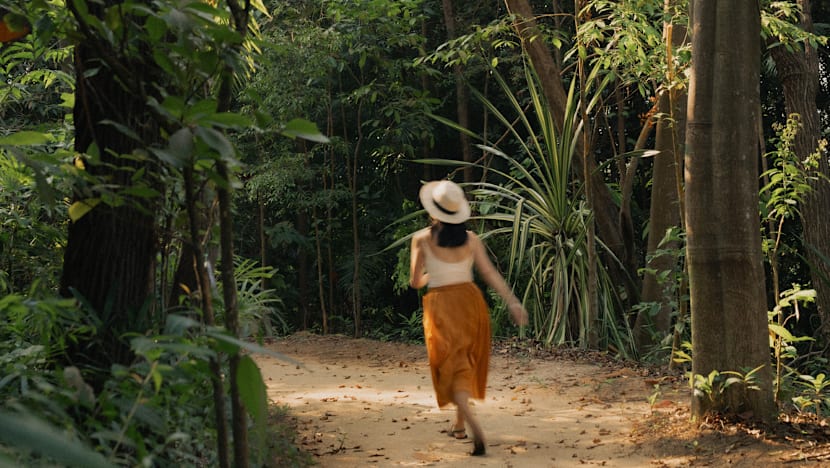How families are finding restoration in nature – without leaving Singapore
Just minutes from the city, Sentosa invites families to trade screens and pings for sand and birdsong.

From languid beaches to scenic trails, Sentosa offers families space to recharge and reconnect with nature. Photos: Sentosa

This audio is generated by an AI tool.
Like many busy Singapore households, Mr Dave Teo finds the daily juggle between work stress and family life exhausting.
“By the time I’m done with work, I feel drained, but my kids are still full of energy,” said the 38-year-old software engineer, who has two children aged four and seven.
He added: “Both of them love watching YouTube and playing games on their tablets, but we don’t want them to get hooked. Every night becomes a negotiation – ‘Papa, just five more minutes!’ Say no and there’s a tantrum. Say yes and I feel guilty. This constant balancing act really weighs on us.”
Mr Teo is far from alone. A survey by the Ministry of Digital Development and Information in September found that children in Singapore aged two to 12 spend more time on recreational screen use than recommended.
The Ministry of Health advises limiting screen time to one to two hours a day for children under 12, depending on age. However, many children exceed this limit, particularly on weekends. Among children aged two to six, 58 per cent exceeded the daily limit on weekdays, with the proportion rising sharply to 81 per cent on weekends.

This has raised concerns about “brain rot”, which refers to the effects of bingeing on low-quality online content. Research suggests that constant exposure to short, fast-paced content can overload the brain, leading to reduced attention spans, mental fatigue, poorer memory and problem-solving skills, and even symptoms of stress, anxiety and depression.
Ms Goh Xiang Yi, 39, a director at a media agency and mother of a four-year-old, has similar worries. “Too much screen time cuts into physical activity, but when you’re busy, it’s hard to avoid and can lead to dependency,” she said. “At the same time, avoiding screens entirely just isn’t realistic. The question is how to navigate this fine line.”
NATURE RESETS THE FAMILY RHYTHM
Experts say one proven way is to spend more time outdoors. Being in nature can help families reconnect with one another, while research shows it reduces cortisol by 21 per cent and stress markers by 28 per cent. Both Ms Goh and Mr Teo said their children are usually in better moods and sleep more soundly after spending time outdoors.
“They’re crankier when they’ve been on the tablet too much. Bedtime also becomes a battle,” said Mr Teo. “But if we take them out – even just for a couple of hours at a nearby park – they come back sweaty and tired, but happy. For us parents too, being outdoors helps ease stress.”
Ms Goh shared how their family recently embarked on a screen detox by spending more time outside – cycling, swimming, tossing a rugby ball around. “The outdoor time has lifted the whole family’s mood, and weekends feel fuller and more meaningful,” she said.
NO PASSPORT REQUIRED: SENTOSA AS A NATURAL PLAYGROUND
For parents stressed about planning family activities, Sentosa offers a restorative retreat to unplug and reconnect. Just minutes from the mainland, the island resets the senses with its mix of sea, sand, sun, and greenery – no packing lists or passports required. Children can roam and explore while parents find space to slow down and breathe.
Among Sentosa’s main draws are Palawan and Siloso Beach, where the calm waters are well-suited for young children. Here, little ones build sandcastles and splash in the shallows as parents relax nearby.

For Mr Teo, these outings are a regular highlight. “My kids are happiest when they can run around, dig in the sand, chase bubbles,” he shared. “When we’re all engaged in the moment – kicking ball together or laughing over some silly game – that’s when we really feel connected.”
Beyond the beaches, Sentosa’s trails offer a different kind of escape. The 2.3km Imbiah Trail winds through lush forest, where families may spot peacocks, hornbills, long-tailed macaques and golden orb spiders. At the top of the trail, a three-storey birdwatching tower offers a fun climb and sweeping views of cable cars gliding past.
For a different perspective, the 2.2km Coastal Trail runs along mangroves and shoreline. With paved paths that are stroller-friendly and bicycles available for rent via bike-sharing services, families can enjoy scenic views together – whether exploring on wheels or taking a leisurely stroll.
At Tanjong Rimau, also known as Siloso Headland, intertidal tours bring children up close with marine life like corals, sand gobies and swimmer crabs, sparking curiosity about the natural environment.

SHARED MOMENTS THAT BECOME CORE MEMORIES
Ms Goh recounted a recent visit to Sentosa, where she took her son on a ride on the beach shuttle. “Watching his excitement made the whole day feel special,” she shared. “It reminded us how meaningful these little shared adventures can be.”
For families, such moments of connection often become the stories children remember most. The antidote to digital fatigue is not to avoid technology altogether, but to make time to reconnect with nature and be present for one another.
With its easy access, natural settings and range of family-friendly activities, Sentosa offers parents a chance to slow down, recharge and reconnect, without the need for elaborate planning.
Discover how the island’s elements can restore yours, just minutes away at Sentosa.













